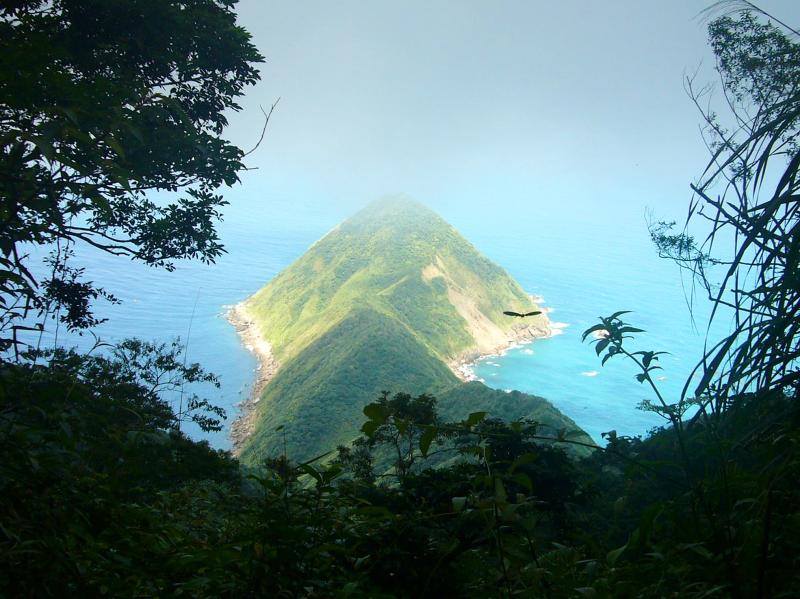Now that John Groot has finished walking 1,200km around Taiwan’s coastline, he can rest his feet and autograph a few books.
Groot will be at the Lei Gallery in Taichung tomorrow to sign copies of his new book, Taiwanese Feet: My walk around Taiwan. It’s the last stop on a summer book tour that included events in the Taipei area and Kaohsiung.
Starting in 2006, Groot set out to walk clockwise around the island. Instead of doing it as a single trek, he broke it up into mostly day hikes and weekend outings. In all, it took him 83 days, spanning eight years.

Photo courtesy of John Groot
Taipei Times’ contributing reporter Bradley Winterton published a review of the book on April 23.
“I give myself a B for following the exact coastline,” said Groot, citing, for example, a decision not to scramble across a stretch of giant concrete tetrapods along the shoreline.
While not the first person to walk around the island, the 55-year-old jovial Canadian is the only one to have chronicled his adventure in book form. In addition to being a travelogue, the book recounts relevant historical events.

Photo courtesy of John Groot
At Saturday’s event, Groot will read excerpts from three sections, including one that describes a humorous incident at a Kaohsiung love motel.
Groot self-published the 222-page book, which is available in paperback and eBook format. He hopes to resume the book tour on the east coast later in the year.
Following the book signing, Groot will lead a discussion on exploring and writing about Taiwan. Afterwards, participants are invited to tour local bars as part of the Taiwanese Feet Beerwalk Pub Crawl.
As for future adventures and literary pursuits, Groot could only speculate for now. But he quickly added: “I’m not going to walk around the island again for sure.”

Google unveiled an artificial intelligence tool Wednesday that its scientists said would help unravel the mysteries of the human genome — and could one day lead to new treatments for diseases. The deep learning model AlphaGenome was hailed by outside researchers as a “breakthrough” that would let scientists study and even simulate the roots of difficult-to-treat genetic diseases. While the first complete map of the human genome in 2003 “gave us the book of life, reading it remained a challenge,” Pushmeet Kohli, vice president of research at Google DeepMind, told journalists. “We have the text,” he said, which is a sequence of

On a harsh winter afternoon last month, 2,000 protesters marched and chanted slogans such as “CCP out” and “Korea for Koreans” in Seoul’s popular Gangnam District. Participants — mostly students — wore caps printed with the Chinese characters for “exterminate communism” (滅共) and held banners reading “Heaven will destroy the Chinese Communist Party” (天滅中共). During the march, Park Jun-young, the leader of the protest organizer “Free University,” a conservative youth movement, who was on a hunger strike, collapsed after delivering a speech in sub-zero temperatures and was later hospitalized. Several protesters shaved their heads at the end of the demonstration. A

Every now and then, even hardcore hikers like to sleep in, leave the heavy gear at home and just enjoy a relaxed half-day stroll in the mountains: no cold, no steep uphills, no pressure to walk a certain distance in a day. In the winter, the mild climate and lower elevations of the forests in Taiwan’s far south offer a number of easy escapes like this. A prime example is the river above Mudan Reservoir (牡丹水庫): with shallow water, gentle current, abundant wildlife and a complete lack of tourists, this walk is accessible to nearly everyone but still feels quite remote.

In August of 1949 American journalist Darrell Berrigan toured occupied Formosa and on Aug. 13 published “Should We Grab Formosa?” in the Saturday Evening Post. Berrigan, cataloguing the numerous horrors of corruption and looting the occupying Republic of China (ROC) was inflicting on the locals, advocated outright annexation of Taiwan by the US. He contended the islanders would welcome that. Berrigan also observed that the islanders were planning another revolt, and wrote of their “island nationalism.” The US position on Taiwan was well known there, and islanders, he said, had told him of US official statements that Taiwan had not